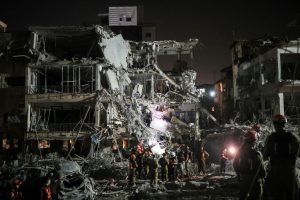The Israel and US Aggression Against Iran Soil, marked by the coordinated airstrikes on Iran’s nuclear facilities in June 2025, has plunged the Middle East into a precarious state of heightened tensions and potential catastrophe. Launched by Israel on June 13 and joined by the United States on June 21, these strikes targeted Iran’s key nuclear sites at Fordow, Natanz, and Isfahan, aiming to disrupt Iran’s nuclear program.
Historical Context of the Conflict
However, the Israel and US Aggression Against Iran Soil has sparked widespread condemnation and threatens severe repercussions for Israel, neighboring countries, and global stability.
This article examines the events, motivations, legal violations, and far-reaching consequences of this aggression, highlighting the risks of escalation, nuclear proliferation, and economic disruption that could destabilize the region and beyond.
The Israel and US Aggression Against Iran Soil is rooted in decades of enmity between Iran, Israel, and the United States.
Iran’s 1979 Islamic Revolution set the stage for a rivalry exacerbated by U.S. support for Israel and sanctions against Iran.
The Joint Comprehensive Plan of Action (JCPOA), signed in 2015 to limit Iran’s nuclear activities, was undermined when the U.S. withdrew in 2018 under President Donald Trump, leading to Iran’s increased uranium enrichment.
By 2025, reports—though disputed—suggested Iran was nearing weapons-grade uranium, prompting fears in Israel and the U.S.
Israel’s initial strikes on June 13 targeted Iran’s military and nuclear infrastructure, killing senior officials and scientists.
The U.S. joined with B-2 stealth bombers and bunker-buster bombs, escalating the Israel and US Aggression Against Iran Soil into a direct assault on a sovereign nation.
The strikes, dubbed “Operation Midnight Hammer,” were justified as preemptive, but Iran and international observers argue they violated international law, setting a dangerous precedent.
Details of the Israel and US Aggression Against Iran Soil
On June 13, Israel launched Operation Rising Lion, targeting Iran’s nuclear sites, ballistic missile facilities, and military leadership.
Over 200 fighter jets struck Natanz and Parchin, killing figures like Mohammad Hossein Bagheri, Iran’s armed forces chief of staff.
The U.S. escalated the campaign on June 21, deploying B-2 bombers and Tomahawk missiles to hit Fordow, Natanz, and Isfahan.
President Trump claimed the strikes “completely obliterated” these sites, though assessments suggest significant but not total destruction.
Iran reported over 1,000 civilian deaths, with residential areas and infrastructure damaged.
The Israel and US Aggression Against Iran Soil prompted Iran to retaliate with ballistic missiles and drones, killing 24 in Israel and wounding hundreds.
A ceasefire on June 23 halted direct hostilities, but Iran’s vow of a “harsher response” signals ongoing risks.
The International Atomic Energy Agency (IAEA) reported no radiation leaks, but the strikes disrupted IAEA monitoring, raising proliferation concerns.
Legal and Ethical Violations
The Israel and US Aggression Against Iran Soil violates core principles of international law. Article 2(4) of the UN Charter prohibits the use of force against a state’s territorial integrity without UN authorization or clear self-defense justification.
Iran posed no imminent threat, rendering the strikes illegal. The Geneva Conventions’ Additional Protocol I, Article 56, protects nuclear facilities from attacks that risk dangerous releases, a concern echoed by the IAEA.
UN Secretary-General António Guterres called the strikes a “dangerous escalation,” warning of catastrophic consequences.
Iran’s Foreign Minister Abbas Araghchi accused the U.S. of breaching the UN Charter and the Nuclear Non-Proliferation Treaty (NPT).
The Israel and US Aggression Against Iran Soil has been labeled a war crime by human rights groups, citing civilian casualties and environmental risks.
Yet, global powers’ silence—due to U.S. veto power and alliances—underscores a failure of international justice.
Consequences for Israel
The Israel and US Aggression Against Iran Soil places Israel in a precarious position. Iran’s retaliatory missile strikes, including hypersonic missiles, exposed vulnerabilities in Israel’s Iron Dome, with significant civilian injuries.
Analysts warn that renewed conflict could be bloodier, as Iran prepares for decisive strikes. Hezbollah, Iran’s proxy in Lebanon, may mobilize, draining Israel’s military resources.
Israel’s domestic debate reflects unease. While Prime Minister Benjamin Netanyahu praised the strikes, critics question whether they enhanced security or escalated risks.
The Israel and US Aggression Against Iran Soil may strengthen Iran’s resolve, potentially pushing it to exit the NPT and pursue nuclear weapons, posing an existential threat to Israel.
Furthermore, Israel risks diplomatic isolation, as Arab states wary of Iran may still hesitate to deepen ties under the Abraham Accords due to public backlash over Palestinian issues.
Regional Repercussions
The Israel and US Aggression Against Iran Soil threatens neighboring countries with instability. Iran’s threat to close the Strait of Hormuz, through which 20% of global oil flows, could spike oil prices, triggering inflation and supply chain disruptions.
Gulf states like Saudi Arabia, balancing U.S. ties and Chinese partnerships, face pressure to reassess alignments. The Houthis in Yemen, emboldened by Iran, have threatened Red Sea shipping, risking broader economic fallout.
Iraq and Lebanon, already fragile, face heightened risks from Iranian-backed militias targeting U.S. bases. Syria, under Russian influence, may see increased Russian assertiveness, complicating regional dynamics.
The Israel and US Aggression Against Iran Soil could ignite proxy wars, displacing populations and exacerbating humanitarian crises in Yemen, Lebanon, and Iraq.
Nuclear Proliferation Risks
Ironically, the Israel and US Aggression Against Iran Soil may accelerate nuclear proliferation. Iran’s suspension of IAEA cooperation and threats to exit the NPT signal a shift toward weaponization.
Experts estimate Iran retains enough enriched uranium for 10-12 nuclear weapons if further refined, despite the strikes setting back its program by two years.
Saudi Arabia has indicated it may pursue nuclear weapons if Iran does, sparking a regional arms race. Nonaligned states, perceiving preemptive strikes as normalized, may seek nuclear deterrents, undermining the global nonproliferation regime.
The Israel and US Aggression Against Iran Soil thus risks a cascade of nuclear ambitions, destabilizing the Middle East and beyond.
Global Economic and Geopolitical Impacts
The Israel and US Aggression Against Iran Soil has reverberated globally. Oil price spikes have strained economies, particularly in developing nations.
China, positioning itself as a neutral broker, is expanding its Middle Eastern influence, while Russia leverages anti-Western sentiment.
Europe, advocating diplomacy, remains sidelined, with leaders like Emmanuel Macron questioning the strikes’ legality.
The U.S.’s $37 trillion debt and $12 trillion spent on Middle East conflicts since 2003 highlight the unsustainability of such interventions.
The strikes have strained U.S.-European relations, as allies fear escalation. The Israel and US Aggression Against Iran Soil risks entangling the U.S. in a prolonged conflict, endangering American troops and civilians in the region.
Proposed Solutions and Path Forward
To mitigate the fallout of the Israel and US Aggression Against Iran Soil, urgent steps are needed:
- UN Security Council Action: Convene an emergency meeting to enforce a ceasefire and condemn the strikes, ensuring accountability.
- Diplomatic Engagement: Resume nuclear talks with Iran, offering sanctions relief for robust IAEA inspections to prevent weaponization.
- Regional Peace Conference: Involve the U.S., Russia, China, and regional powers to address proxy conflicts and stabilize the Middle East.
- Humanitarian Aid: Support displaced populations in Iran and neighboring states to alleviate suffering.
- Restraint on Israel: Pressure Israel to halt further strikes and prioritize Palestinian peace talks to reduce regional tensions.
Conclusion
The Israel and US Aggression Against Iran Soil has unleashed a cascade of dangers, from heightened risks to Israel’s security to regional instability and global economic fallout.
By violating international law and ignoring diplomacy, the strikes have strengthened Iran’s defiance and risked nuclear proliferation. Israel faces retaliation and isolation, while neighboring countries brace for economic and humanitarian crises.
The international community’s silence emboldens impunity, undermining global justice. Only through immediate diplomacy, accountability, and collective action can the catastrophic consequences of this aggression be averted, paving the way for a stable Middle East.
source: raialkhalij


